Module 1 Travel 模块小结课件 61张PPT
文档属性
| 名称 | Module 1 Travel 模块小结课件 61张PPT |  | |
| 格式 | ppt | ||
| 文件大小 | 4.3MB | ||
| 资源类型 | 试卷 | ||
| 版本资源 | 外研版 | ||
| 科目 | 英语 | ||
| 更新时间 | 2021-03-02 20:05:56 | ||
图片预览

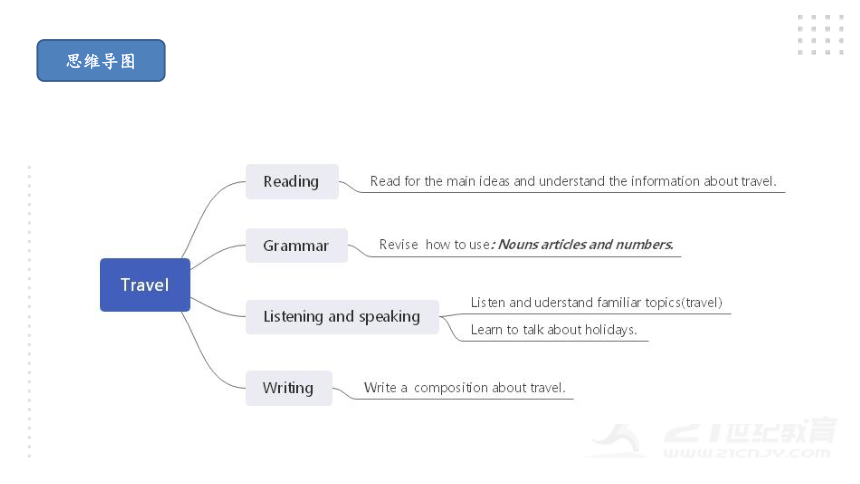
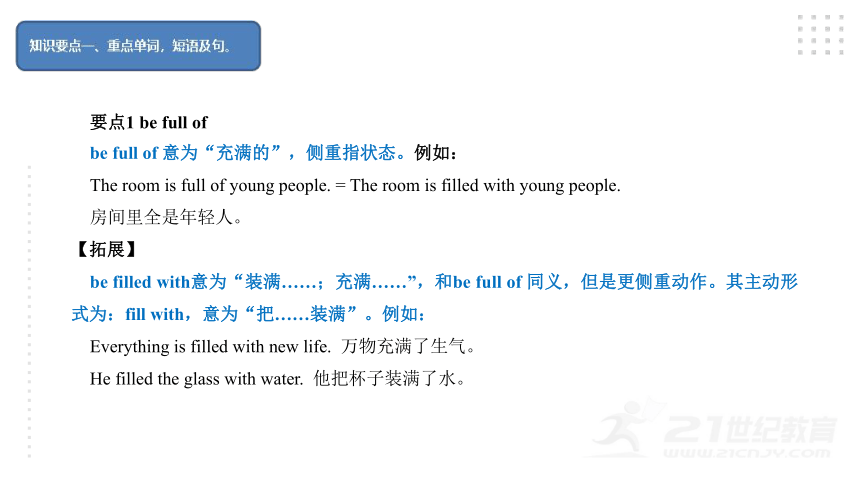
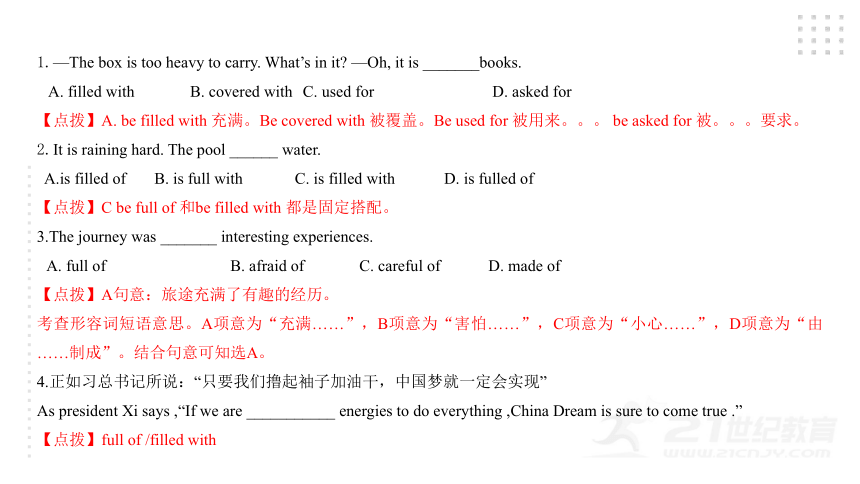
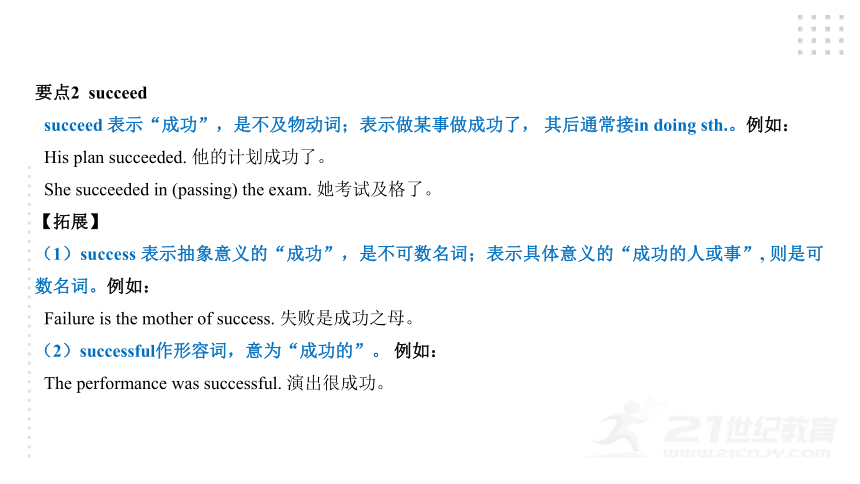

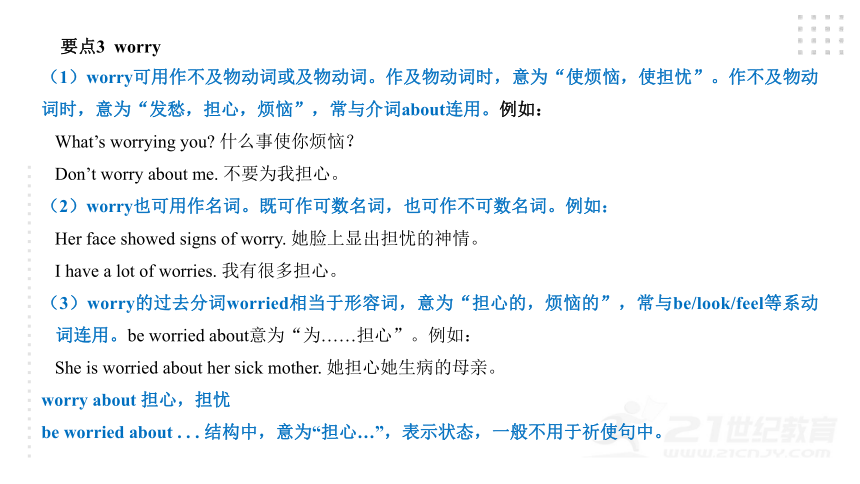
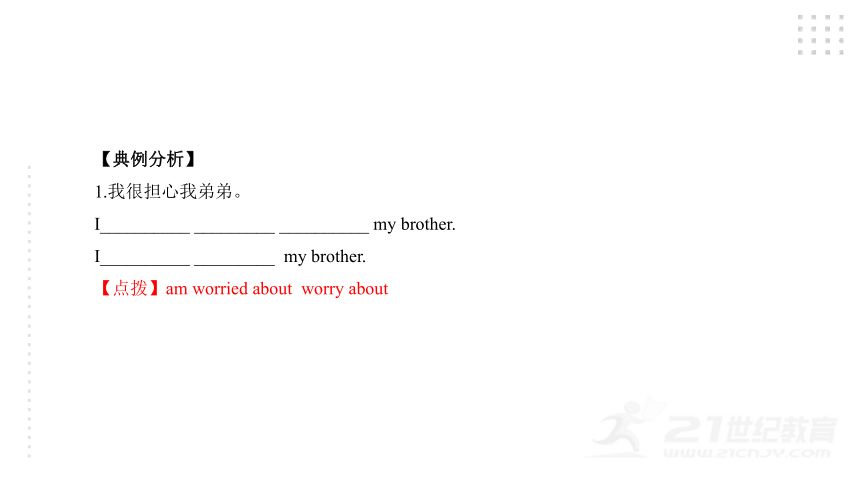
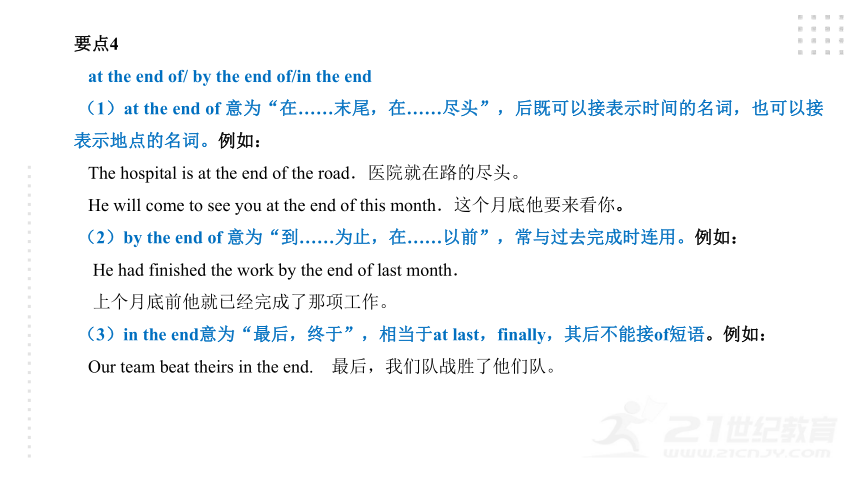
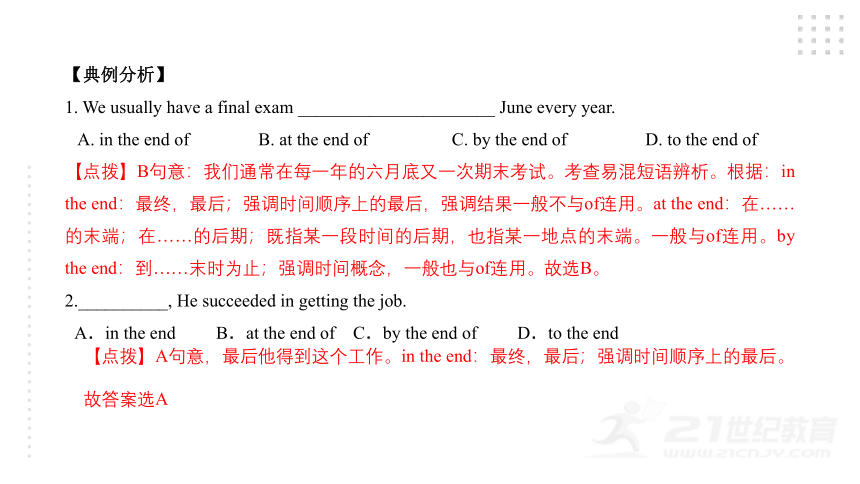
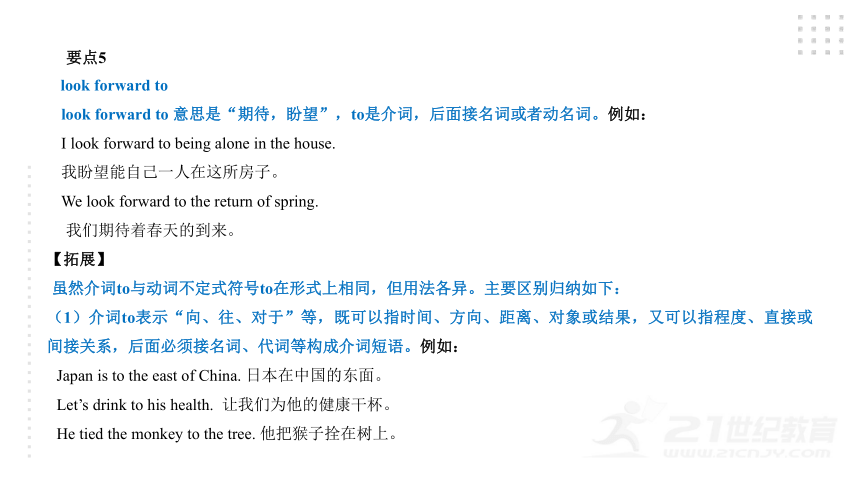
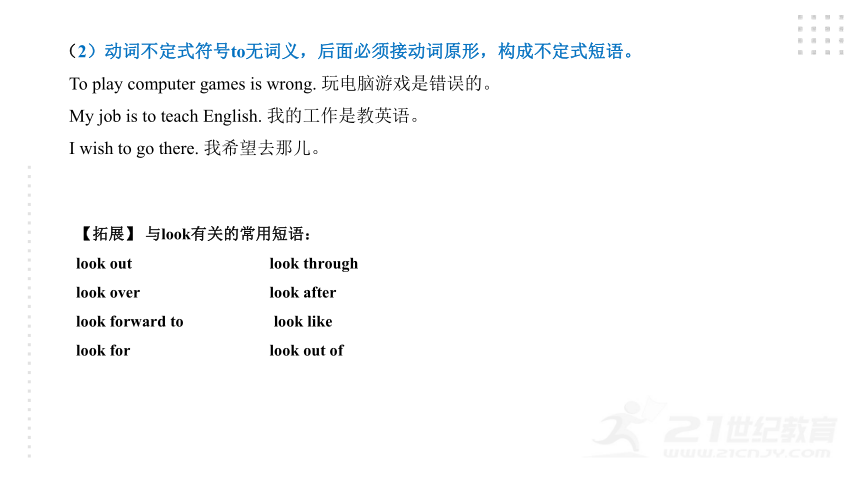
文档简介
英语(外研版)
九年级 下册
Module 1
Travel
English
模块小结
思维导图
要点1 be full of
be full of 意为“充满的”,侧重指状态。例如:
The room is full of young people. = The room is filled with young people.
房间里全是年轻人。
【拓展】
be filled with意为“装满……;充满……”,和be full of 同义,但是更侧重动作。其主动形式为:fill with,意为“把……装满”。例如:
Everything?is?filled?with?new?life.? 万物充满了生气。
He filled the glass with water. 他把杯子装满了水。
1.—The box is too heavy to carry. What’s in it? —Oh, it is _______books.
A. filled with B. covered with C. used for D. asked for
【点拨】A. be filled with 充满。Be covered with 被覆盖。Be used for 被用来。。。 be asked for 被。。。要求。
2.It is raining hard. The pool ______ water.
A.is filled of B. is full with C. is filled with D. is fulled of
【点拨】C be full of 和be filled with 都是固定搭配。
3.The journey was _______ interesting experiences.
A. full of B. afraid of C. careful of D. made of
【点拨】A句意:旅途充满了有趣的经历。
考查形容词短语意思。A项意为“充满……”,B项意为“害怕……”,C项意为“小心……”,D项意为“由……制成”。结合句意可知选A。
4.正如习总书记所说:“只要我们撸起袖子加油干,中国梦就一定会实现”
As president Xi says ,“If we are ___________ energies to do everything ,China Dream is sure to come true .”
【点拨】full of /filled with
?
要点2 succeed
succeed 表示“成功”,是不及物动词;表示做某事做成功了, 其后通常接in doing sth.。例如:
His plan succeeded. 他的计划成功了。
She succeeded in (passing) the exam. 她考试及格了。
【拓展】
(1)success 表示抽象意义的“成功”,是不可数名词;表示具体意义的“成功的人或事”, 则是可数名词。例如:
Failure is the mother of success. 失败是成功之母。
(2)successful作形容词,意为“成功的”。 例如:
The performance was successful. 演出很成功。
【典例分析】
1、用succeed,success和successful
1)At last he __________ in solving the problem.
2)His new book was a great ____________.
3)It was a_______________ experiment.
【点拨】1. succeeded succeed in doing sth表示做某事做成功了.动词。 2. success 3. Successful
2.Mr Smith is certain to succeed in ________ his experiment, and he never ________.
A. doing; gives up B. do; gave up C. did; keeps on D. done; set out
【点拨】A句意:史密斯先生的实验一定会成功,他从不放弃。
考查动词形式及短语辨析。give up放弃,gives up是三单形式,gave up是过去式;keep on坚持;set out出发。succeed in doing成功做了某事,固定结构;never(从不)用于一般现在时,he是单数第三人称,动词需用三单形式;根据“Mr Smith is certain to succeed史密斯先生一定会成功”,可知他从不放弃,故选A。
要点3 worry
(1)worry可用作不及物动词或及物动词。作及物动词时,意为“使烦恼,使担忧”。作不及物动词时,意为“发愁,担心,烦恼”,常与介词about连用。例如:
What’s worrying you? 什么事使你烦恼?
Don’t worry about me. 不要为我担心。
(2)worry也可用作名词。既可作可数名词,也可作不可数名词。例如:
Her face showed signs of worry. 她脸上显出担忧的神情。
I have a lot of worries. 我有很多担心。
(3)worry的过去分词worried相当于形容词,意为“担心的,烦恼的”,常与be/look/feel等系动词连用。be worried about意为“为……担心”。例如:
She is worried about her sick mother. 她担心她生病的母亲。
worry about 担心,担忧
be worried about . . . 结构中,意为“担心…”,表示状态,一般不用于祈使句中。
【典例分析】
1.我很担心我弟弟。
I__________ _________ __________ my brother.
I__________ _________ my brother.
【点拨】am worried about worry about
要点4
at the end of/ by the end of/in the end
(1)at the end of 意为“在……末尾,在……尽头”,后既可以接表示时间的名词,也可以接表示地点的名词。例如:
The hospital is at the end of the road.医院就在路的尽头。
He will come to see you at the end of this month.这个月底他要来看你。
(2)by the end of 意为“到……为止,在……以前”,常与过去完成时连用。例如:
He had finished the work by the end of last month.
上个月底前他就已经完成了那项工作。
(3)in the end意为“最后,终于”,相当于at last,finally,其后不能接of短语。例如:
Our team beat theirs in the end. 最后,我们队战胜了他们队。
?
【典例分析】
1. We usually have a final exam ______________________ June every year.
A. in the end of B. at the end of C. by the end of D. to the end of
【点拨】B句意:我们通常在每一年的六月底又一次期末考试。考查易混短语辨析。根据:in the end:最终,最后;强调时间顺序上的最后,强调结果一般不与of连用。at the end:在……的末端;在……的后期;既指某一段时间的后期,也指某一地点的末端。一般与of连用。by the end:到……末时为止;强调时间概念,一般也与of连用。故选B。
2.__________, He succeeded in getting the job.
A.in the end B.at the end of C.by the end of D.to the end
【点拨】A句意,最后他得到这个工作。in the end:最终,最后;强调时间顺序上的最后。
故答案选A
要点5
look forward to
look forward to 意思是“期待,盼望”,to是介词,后面接名词或者动名词。例如:
I look forward to being alone in the house.
我盼望能自己一人在这所房子。
We look forward to the return of spring.
我们期待着春天的到来。
【拓展】
虽然介词to与动词不定式符号to在形式上相同,但用法各异。主要区别归纳如下:
(1)介词to表示“向、往、对于”等,既可以指时间、方向、距离、对象或结果,又可以指程度、直接或间接关系,后面必须接名词、代词等构成介词短语。例如:
Japan is to the east of China. 日本在中国的东面。
Let’s drink to his health. 让我们为他的健康干杯。
He tied the monkey to the tree. 他把猴子拴在树上。
(2)动词不定式符号to无词义,后面必须接动词原形,构成不定式短语。
To play computer games is wrong. 玩电脑游戏是错误的。
My job is to teach English. 我的工作是教英语。
I wish to go there. 我希望去那儿。
【拓展】 与look有关的常用短语:
look out look through
look over look after
look forward to look like
look for look out of
【典例分析】
1.—I don’t know the new word. —It doesn’t matter, you can ________ in the dictionary.
A.look up it B.look it up C.look for it
【答案】B
【解析】句意:我不认识这个生词,没关系,你可以在字典里查一下它。
考查动词短语的辨析。look for的意思是“寻找”;look up的意思是“查字典”,跟代词时应该放在look与up的中间,因此,答案为B项。
2.—What’s the meaning of “One Belt and One Road”? —Let me _____ the words in the new dictionary.
A. look at B. look for C. look after D. look up
【点拨】用短语辨析法解题。look at 看……;look for 寻找;look after 照顾;look up 查找。结合句意可知,“在词典中查找单词”。
3.When you don’t know a word,you can________ in the dictionary.
A. look it up B. set it up C. give it up D. pick it up
【点拨】考查固定短语。 A. look it up查单词;B. set it up 建立;C. give it up放弃;D. pick it up 拾起;句意:当你不知道这个单词的意思时,请查个字典,故选A项。
4. My mother is ill in hospital. I have to ________ my grandparents at home.
A.look for B.look at C.look up D.look after
【点拨】A.look for 寻找 B.look at看 C.look up 查阅 D.look after照顾。根据句意选D。
5.—Have you seen the film Coming Home directed by Zhang Yimou?
—Not yet. I'm ________ seeing it. It's said that the film is great!
A.looking down on B.looking out for C.looking up to D.looking forward to
【点拨】句意:还没有看,我期待看,听说这部电影很好。looking forward to 期待。
6.—I'm really tired and my leg is hurt. I have to stop running.
—________,Tom. There is a big stone in front of you.
A. Have fun B. Take care C. Come on D. Good luck
【点拨】B句意:----我真的很累,我的腿疼。我必须停止跑步。-----小心点,汤姆。在你面前有一块大石头。考查情景交际。A. Have fun祝你玩得开心;B. Take care保重,当心;C. Come on快点,加油;D. Good luck祝您好运。根据下文“在你面前有一块大石头”可知“小心点,汤姆”;结合句意可知填Take care;选B。
要点 6
be afraid …
(1)be afraid表示“害怕做某事”或“不敢做某事”,be afraid 之后可接不定式,也可接名词、代词或of doing sth.。例如:
She was afraid to tell you. 她害怕告诉你。
She is afraid of going out alone late at night. 她很怕深夜独自外出。
(2)要表示担心可能会发生某事,则只能用 be afraid of doing而不能用 be afraid to do。例如:
I’m afraid of being late for class. 我担心上课迟到。
(3)be afraid后可接that从句。
He is afraid that his father will be unhappy.
他担心他的爸爸会不高兴。
【典例分析】
1. I am afraid _______ speak English in class,because I am afraid _______ being laughed at.
A. to; of B. of; to C. in; of D. of; in
【点拨】be afraid to do sth. 害怕做某事,to后加动词原形。be afraid of sth. 害怕某事,of后加名词或者动名词。
2.我害怕夜晚出去
I_________ _________ ___________ ___________ out at night.
= I __________ ____________ _____________ __________ out at night
【点拨】am afraid to go / am afraid of going
3.恐怕这次你又不及格。
_________ __________ _________ you couldn’t pass the exam.
【点拨】I’m afraid that. 恐怕。不是“害怕”之意。委婉语气。
要点7
decide是动词,意为“决定,选定”。名词为decision。
(1)decide sth. 意为“决定某事”。例如:
I can’t decide anything at the moment. 现在我不能做出任何决定。
(2)decide to do sth. 意为“决定做某事”。例如:
We decide to go to Paris next month. 我们决定下个月去巴黎。
(3)decide on…意为“由……决定;选定……”。后面接名词、代词或动名词作宾语。例如:
I decided on going to Beijing at last. 最后我决定去北京了。
My mother decided on the red dress. 我妈妈决定买下那件红色的裙子。
Make a decision to =decide to do
【典例分析】
1.他们决定把会议推迟。
They __________ ___________ delay the meeting
=They __________ ___________ __________ __________delay the meeting
【点拨】decided to\ made a decision to. decide to do sth. 意为“决定做某事
2.我们决定离开。
We _________ ____________leaving.
【点拨】decided on
3.他决定不换工作。
He _________ ___________ _________ change his job.?
【点拨】decided not to
要点8 take off
(1)take off 意为 “起飞”。例如:
When will the plane take off? 飞机什么时候起飞?
(2)take off还可作“脱下”讲,反义词组为put on,意为“穿上”。例如:
Put on your clothes. Don’t take them off. 把衣服穿上,别脱下。
(3)off还有不上学、不上班的意思,所以take some time off就是“请假”的意思。
【拓展】 常见的含有take的词组:
take turns轮流 take away拿走 take out拿出,取出
take over接手,接管 take notes 做笔记 take care当心,注意
take care of 照顾 take photos 照相 take it easy别紧张
take down 取下、拿下;写下、记录; take in 吸入 领悟,理解
take up 占据(一定的时间、空间、精力......);开始从事......
【典例分析】
一、用take构成的短语完成句子
1.他长得像他父亲
He__________ _______ his father
【点拨】takes after take after 长得像......、性格特征像.....
2.母亲把我们的盘子拿走,回来拿一些水果给我们吃
Mother _________our plates __________and came back with some fruit for us to eat.
【点拨】took away 拿走
3.那首曲子把我带回到童年时代
That music ________ me________ to my childhood.
【点拨】took back 带回。
4.我们需要把窗帘拿下来清洗下
We need to _________ __________ the curtains to be cleaned.
【点拨】take down取下、拿下
5. 如果你有钢笔,可以把我的电话号码记下来
If you have a pen, you can ________ _________ my phone number.
【点拨】take down。写下、记录
6.这种布料吸水性很好。
This kind of cloth _______ _______water very well.
【点拨】takes in 吸入 领悟,理解
7.飞往曼谷的航班准时起飞。
The flight for Bangkok ________ ________ on time.
【点拨】took off “起飞”
8.天气太热了,所以我把夹克衫脱掉了
It was hot, so I________ my jacket __________.
【点拨】took off“脱下”
9.她请两天假来照顾她奶奶。
She __________two days _________school to _________ _________ _________his grandma.
【点拨】took off “请假” take care of “照顾“
10.请在整个房子有臭味前把垃圾清除出去
Please _________ ________the trash before the whole house starts to smell.
【点拨】took out拿出,取出
11.自从他挂了之后,他的儿子就接管了他的公司。
His son has ________ ________ his company since he died。
【点拨】taken over 接手,接管
12. 有关金融的书籍占用了三个书架
The books on finance_______ ________ three shelves.
【点拨】take up 占据(一定的时间、空间、精力......);开始从事......
13.The plane to Chengdu just now.You have to wait until tomorrow.
A. took off B. took after C. took out D. took away
【点拨】A句意:去成都的飞机刚刚起飞,你得等到明天。考查动词短语。A. took off(飞机等)起飞,脱下;B. took after长得像,性格类似于,效仿;C. took out拿出,取出;D. took away拿走。结合句意可知填took off;选A。
要点9
because of和because是同义词,都可以表示原因,但是,because的后面用句子;because of的后面用名词、代词或者动名词短语形式。例如:
I was late this morning because I missed the first bus.
我今天早上迟到是因为我没能赶上第一班公共汽车。
We couldn’t have the sports meeting last Sunday because of the rain.
我们上个星期天没能召开运动会是因为下雨了。
【典例分析】
1.The students didn’t need to go to school because there was a storm. (同义句改写)
The students didn’t need to go to school __________ ____ the storm.
【点拨】 because of
2.He was ill, so he didn’t go to school. (同义句改写)
_____________ he was ill, he didn’t go to school.
【点拨】Because
3. He couldn’t walk because his leg was broken. (同义句改写)
He couldn’t walk ____________ ________ his _________ leg.
【点拨】because of broken
4. I came back because it was raining heavily. (同义句改写)
I came back ___________ ________ the ________ rain.
【点拨】 because of heavy
5. ______ I don’t have enough money, ______ I can’t afford the car.
A. /; so B. Because; so C./; and D./; because
【点拨】A because通常用来回答why提出的问题,与so不能同时使用。
6. He didn’t go to school yesterday ____ he was ill.
A. because B. because of C. if D. so
【点拨】because 后面通常接句子,表示“原因”。Because of 接短语。
7. I didn’t go to the party not________ the weather, but _______I didn’t feel well.
A. because of; because B. because; because of
C. because; because D. because of; because of
【点拨】A句意:我没去聚会不是因为天气,而是因为我感觉不舒服。
because of 和because都表示原因,区别是前者后面接名词性短语,后者接从句。前文根据the weather可知用because of,后者根据I didn't feel well可知用because。故选A。
?
要点10
had better(常简略为’d better)是一固定词组,had better意为“最好”,用于表示对别人的劝告、建议或表示一种愿望。其用法有以下几点:
1)had better后面必须跟动词原形,构成had better do sth.句型。
【注意】这里的had不能用have来替换。例如:
You’d better go to hospital at once. 你最好立即去医院看病。
Tom, you’d better go there today. 汤姆,你最好今天去那里。
(2)主语不论是第几人称,句子不论是什么时态,都要用had better的形式。例如:
Now you(he; we) had better listen to the teacher.
你(他,我们)现在最好听老师讲。
【典例分析】
1. You'd better ________ late for school again.
A. not to be B. not be C. won't be D. don't be
【答案】B
【解析】句意:你最好不要再上学迟到了。短语had better (not) do sth.:最好(不)做某事;结合选项和句意可知选B。
2.You had better ________ hair tomorrow. It's too long.
A.cut you B.cut your C.not cut you D.not cut your
【答案】B
【解析】句意:你最好明天剪头发,它太长了。
根据It's too long 可知是剪头发,排除C/D;had better最好,可看作是情态动词,用于一切人称,没有词形变化,后接不带to的不定式,,意思是最好做某事;根据hair可知用形容词性的物主代词来修饰;故选B。
3. 你最好不要把孩子单独留在家里。
You _________ _______ _________ __________ your child alone at home.
【答案】had better not leave
4.你最好不要制造噪音。
You __________ __________ __________ _________ noise.
【答案】had better not make
5.你最好不要走路去,太远了.
__________ ___________ ___________ ___________ there , it’s too far away .
【答案】You’d better not walk (注意空和缩写)
要点11
too…to…意为“太……而不能”。它在结构形式上是肯定的,但意义上却表示否定含义,所以动词不定式符号to前不能再加not,只接动词原形即可,too后接形容词或副词原形。例如:
The book is too difficult to understand. 这本书难于理解。
【拓展】
(1)含too…to…的句子可以改写成“so…that…”句型,意为“如此……以至于……”。例如:
He is too old to do hard work. = He is so old that he can’t do hard work.
他年纪太大而不能干重活。
(2)含too…to…的句子也可以用“not … enough to do sth.”句型来替换,但注意要用原句中形容词或副词的反义词。例如:
He is too old to do hard work. = He is not young enough to do hard work.
他年纪大了,不能干重活。
【典例分析】
1.I often laugh when I see my grandma learning pop songs, but she says, “one is never _____ old to learn. ”
A. too B. so C . very D. quite
【点拨】句意:当我看到奶奶在学流行歌曲时,我经常笑,但她说:“活到老学到老。” too…to…意为“太……而不能……”
2. He runs _______ to catch up with me .
A. too fast B. quick enough C. quickly enough
【点拨】修饰动词用副词,enough 放在形容词副词后面。
3. I’m ____ I can’t say a word
A. too happy to B. happy enough that C. so happy that
【点拨】A so。。。that 如此。。以致。that后面接句子。too。。。to 太。。。而不能。To后面接动词。
4.Betty如此生气,以致说不出话来。
Betty was _____ ______ _______ she _______ say a word.
Betty was _____ ______ ______ say a word.
【点拨】so angry that couldn’t too angry to
5.我激动得睡不着。
I was ________ ________ ___________ I couldn’t fall asleep.
I was ________ ________ __________ fall asleep.
【点拨】so excited that too excited to
6.Jim is so young that he can’t look after himself. (改为同义句)
①Jim is __________young __________look after himself.
Jim is __________ old __________ __________ look after himself.
【点拨】too。。。to 太。。。而不能。 not enough 不够。。。以致不能。
7. He has to earn lots of money _____ he can buy his children nice food and clothes.
A. so that B. such that C. that D. in order
【点拨】A句意:他必须挣很多钱才能给孩子们买好的食物和衣服。So that 表示目的状语从句。
8. The camera is _______ expensive _______ I can’t afford it.
A. so; that B. such; that C. too; to D. enough; to
【点拨】A句意:这照相机太贵了,我买不起。A. so+adj/adv+that+句子“如此……以至于……”;B. “such a/an+adj+可数名词单数+that+句子”或者“such+adj+可数名词复数/不可数名词+that+句子”“如此……以至于”; C. too adj to do“太……以至于不能……”;D. enough; to 足够。。。以致能
9. The man is ______________ hungry _______________ he can’t say a word.
A. too ; to B. enough ; to C. so ; that D. such ; that
【点拨】C句意:这个男人是如此的饥饿以至于连一句话都说不出来了。考查易混连词辨析。too……to太……而不能做某事;中间连接形容词或副词原形,后接动词原形组成动词不定式;enough to足够的……去做某事;前接形容词或副词原形后接动词原形组成动词不定式;so……that如此的……以至于……;中间连接形容词或副词原形,后接结果状语从句;such……that如此的……以至于……;中间接名词性质的短语后接结果状语从句。根据句中的hungry为形容词,结尾he can’t say a word结果状语从句。故选C。
10. You can hear ______________ much noise _____________ you can’t fall asleep at night.
A. too ; to B. enough ; to C. so ; that D. that
【点拨】C句意:你能听得见如此多的噪音以至于你在夜里都睡不着觉。考查易混连词辨析。too……to太……而不能做某事;中间连接形容词或副词原形,后接动词原形组成动词不定式;enough to足够的……去做某事;前接形容词或副词原形后接动词原形组成动词不定式;so……that如此的……以至于……;中间可以连接修饰数量多少的名词短语,后接结果状语从句;such……that如此的……以至于……;中间接名词性质的短语后接结果状语从句。根据句中的much noise为修饰数量多少的名词短语,结尾的结果状语从句。故选C。
要点12
“one of+the或其他限定词+形容词最高级+名词复数”指在某一范围内“最……之一”,该结构做主语时,谓语动词要用单数形式。
【典例分析】
1.长江是世界上最长的河流之一。
The Changjiang River is _______ ________ ________ _________ _________ in the world.
【点拨】one of the longest rivers
2.他是我们班最优秀的学生之一。
He ________ ________ ________ _________ _________ ________ in our class
【点拨】is one of the best students
3. Teahouse is one of ________________ plays.
A. the Lao She’s most famous B. Lao She’s the most famous
C. the more famous D. Lao She’s most famous
【点拨】D 句意:茶馆是老舍的最著名的话剧之一。考查形容词最高级前面限定词的辨析。根据形容词最高级前面通常有定冠词the,如有物主代词、指示代词、不定代词或名词所有格修饰,the要省略;再根据供选答案中的Lao She’s名词所有格形式。故选D。
4. One of the best plays “Teahouse” ________________ still popular among the old today.
A. be B. is C. are D. was
【点拨】B句意:最好的戏剧之一“茶馆”今天在老年人当中仍然很受欢迎。考查主谓一致的辨析。根据one of +形容词最高级+名词复数+谓语动词但是形式。故选B。
要点13
1.get on的常见用法:
(1)意为“上(车、船、飞机等)”。例如:
They got on the plane at Cairo.他们在开罗上了飞机。
(2)意为“过日子”。例如:
You can’t get on well at all with a low pay of 40 yuan.靠40元的低收入,你根本无法过好日子。
(3)意为“进展,继续”。例如:
The builders couldn’t get on for lack of materials.因为缺少材料,建筑工人干不下去了。
(4)意为“相处”,相当于get along,但get on更正式。例如:
They can’t get on together.他们合不来。
(5)意为“获得成功;事业有成”。例如:
Parents are always anxious for their children to get on.父母总是急切地盼望孩子们事业有成。
2.常见get 短语小结:
get off 下(车、船、飞机等) get away (from...)逃离;离开
get back回来;取回 get over解决;克服
get through用完;度过,熬过(困难时期) get up起床
get it懂得;明白 get in进站;到达
get in one’s way 挡路;妨碍 get in touch with...与……联系
【典例分析】
1. The car ________and stopped at the red traffic light.
A. slowed down B. got on C. picked up D. got off
【点拨】A小汽车减速慢了下来,然后在红灯前停了下来。考察动词词组的辨析。根据句意,这里要用词组 slow down,减速,放慢速度,慢下来,而 get on的意思是上车,pick up意思是“捡起,(车)搭人”,get off的意思是下车,在这里都是不正确的。故选A
2. Anna ________ the bus and found John sitting next to the driver.
A. got on B. gets off C. got off D. gets on
【点拨】A安娜上了公共汽车,发现约翰坐在司机旁边。考察动词词组的辨析。get on:上车 get off:下车。A是过去式,B是一般现在时第三人称单数的形式,C是过去式,D是一般现在时第三人称单数的形式。由句中的found可知,本句是一个一般过去时的句子。结合句意“安娜上了公共汽车,发现约翰坐在司机旁边。”应选A。
?
要点14 重点短语
1.be full of...充满…… 2.because of因为;由于
3.stay with和……待在一起 4.get back to回去;回到……上
5.at the end of...在……结尾;终点 6.worry about担忧……
7.as long as只要 8.look forward to期待
9.say goodbye to sb.向某人说再见 10.take care (告别用语)多保重
11.get on/off上/下(车、船、飞机等) 12.look for寻找
13.have...ready把……准备好 14.take off脱去(衣服等);(飞机等)起飞
15.make oneself comfortable使某人自己舒服,不拘束16.offer to do sth.主动提出/要求做某事
17.make sure确保;务必 18.in time及时 on time按时,准时
19.too...to...太……以至于…… 20.decide to do sth.决定做某事
21.had better 最好做某事 22 be surprised at/about做某事感到吃惊
知识要点二:语法
名词
中考考点一、名词的数:
名词按是否可数分类,可分为可数名词(Countable Nouns)和不可数名词(Uncountable Nouns)。
1.可数名词
可数名词是指能以数目来计算,可以分成个体的人或东西,因此它有复数形式。如cup(杯子),cat(猫)等。
(1)当可数名词为单数时,前要添加冠词。
(2)可数名词复数变化规律。
一般直接+s
book-books pen-pens
以s, x, sh, ch 结尾的单词在词尾+es
class-classes box-boxes
辅音字母+y结尾变y为i 再+es
baby-babies city-cities
?
以o 结尾的词变复数的规则
(有生命的+es, 没生命的+s)
?
tomato-tomatoes potato-potatoes
hero-heroes photo-photos piano-pianos
zoo-zoos kilo-kilos radio-radios
?
以f (e)结尾变f (e)为v再+es
leaf-leaves knife-knives
life-lives shelf-shelves
?
不规则变化
man-men woman-women
policeman-policemen mouse-mice child-children
foot-feet tooth-teeth goose-geese(鹅)
由两个名词组成的复合名词常在最后一个名词变复数。(但如果第一个名词是man或woman时,两个名词都要变复数。)
a boy student—two boy students
an apple tree—six apple trees a man teacher—ten men teachers
a woman nurse—many women nurses)
表示“某国人”单复数变化请记口诀:
中日不变,英法变,其他s加后边。
a Chinese(Japanese)—six Chinese(Japanese)
an Englishman—seven Englishmen
a Frenchman—twelve Frenchmen
an American—four Americans
有些名词通常只用复数形式,
其后谓语动词也要用复数。
people, police, trousers, socks, glasses, clothes, shorts, scissors等。
The people in Guangdong are friendly and kind.
The police arrive soon and catch the thief.
2.?不可数名词
不可数名词是指不能以数目来计算,不可以分成个体的概念、状态、品质、感情或表示物质材料的东西;它一般没有复数形式,只有单数形式,它的前面不能用不定冠词a / an。抽象名词,物质名词和专有名词一般是不可数名词。如 milk(牛奶),bread(面包),coffee(咖啡)等。
中考还会以名词结合感叹句What/What a/What an的选择来考,考生必须熟记不可数名词前没有这一特点,感叹句常出现的不可数名词有:news / advice / weather等等。
如果不可数名词要表示一定的数量,则在其前加数量词表示。如:a bottle of water(一瓶水), four pieces of paper(四张纸)。在这种情况下,后面谓语动词与量词有关。
中考考点二:名词所有格:
表示有生命的东西的名词及某些表示时间、距离、星球、世界、国家等无生命的东西的名词后加’s来表示所有关系,叫做名词所有格。
s属格
(1)不以s结尾的名词在其后+’s。如:
John’s father Children’s Day today’s newspaper the boy’s room.
(2)以s结尾的名词在其后+’。如:
the girls’ desks Teachers’ Day the students’ homework.
(3)并列名词所有格:共有则在最后一名词后+’s属格,分别有则每个名词后都要+’s属格。如:
Tom and Tim’s room(两人共有的房间)
Tom’s and Tim’s rooms(两个分别有一间房,共2间房)
(4)有时表示某人的家,医务室或店铺时,所有格后经常不出现它修饰的名词。如:
at Lucy’s(在露西家) at the doctor’s(在医务室)。
of 属格:不能用s属格的其他情况要用of 属格表示。
the main idea of the story(故事的主要意思); the flowers of the tree(树的花)。
双重所有格:s属格与of 属格相结合。
a classmate of my father’s(我爸爸的一位同学); a car of mine(我的一辆小车)。
数词
中考考点一、基数词
数词(Numeral),是指表示数目多少或顺序多少的词。英语的数词可以作句子的主语、宾语、表语和定语。数词分为两大类,即基数词和序数词。基数词表示数目,如:one, two, three,……;序数词表示顺序,如:first, second, third, fourth……序数词前一般要加the。
1基数词的构成
1
2
3
4
5
6
7
8
9
10
one
two
three
four
five
six
seven
eight
nine
ten
11
12
13
14
15
16
17
18
19
20
eleven
twelve
thirteen
fourteen
fifteen
sixteen
seventeen
eighteen
nineteen
twenty
30
40
50
60
70
80
90
100
21
thirty
forty
fifty
sixty
seventy
eighty
ninety
a hundred
twenty- one
2.基数词表时间
(1)顺读法----先时后分:”几点几分” 9:30 nine thirty
(2)逆读法----先分后时:
表示“几点过几分”,半小时以内,介词用past “ 分钟数+past +钟点数 ”
10:05 five past ten 8:20 twenty past eight
表示“几点差几分”,半小时以上,介词用to “60减原分钟+ to + (下一个)钟点数”
9:55 five to ten 7:40 twenty to eight
(3)15分钟:a quarter 30分钟:a half
3表番号(编号):注意:编号的事物如果数字较大,一般用基数词表达,且放在编号的事物名词之后。
如:No.102 Middle School (102中学); Room 206 (206房间)如果编号的事物数字不大,用序数词表达,但它应放在编号名词之前。如:the first lesson (第一课)
4表岁数或年代。注意:表示“几十”的基数词的复数形式,可用来表示某人的大概岁数或年代。
结构:“ in+ the+整十复数“ / ” in+ the+整十基数词s“
例句:My uncle went to England in his twenties. 我叔叔在20多岁时去了英国。
These eggs were found in the Gobi Desert by a group of scientists in the 1920s.
这些恐龙蛋是20世纪20年代由一群科学家在戈壁沙漠发现的
5数词的复合形容词。 “基数词+名词(+形容词)”构成的复合形容词作定语时,其中的名词用单数形式。如:two-week holiday 两周的假 ; an eighteen-meter-wide street 一条18米宽的街道
但注意它与名词所有格形式作定语的区别。
如:How far is it from your home to your school? It’s about ten minutes’ walk.
从你家到学校多远?大约十分钟路程。
6基数词与“多少又一半”的表达:“多少又一半”的表达有种方法:
一种是“数词+n.(单数或复数)+and a half”;
另一种是“数词+and a half +n.复数”。
如:“两个半月”可译为:two months and a half或two and a half months
7 表示具体数目,hundred, thousand, million不用复数
表示不确定数目,用复数。即hundreds of(数百), thousands of(数千), millions of(数百万)+ 名词复数。可以用many/several修饰,但不能与具体数目连用。
1序数词的构成
第一
第二
第三
第四
第六
第二十
第二十一
first
second
third
fourth
sixth
twentieth
twenty-first
▲1st,2nd,3rd为特殊形式,其它的都是阿拉伯数字后加th。
第一第二第三需要死记硬背,第四开始到第19都是直接在后面加th。整十的基数词要把结尾的y变成ieth。
从20开始,几十几都是 ‘整十基数词+序数词’。
2 序数词作定语,前面要加the;
例句:The first truck is carrying a food basket.
She is my first English teacher.
(注意:若前面序数词前面已经有形容词性物主代词或名词所有格时,则不能再用the)
3 分数 (分子用基数词,分母用序数词。) (上基下序,左基右序。)
分子大于1时,分母加-s。
1/4 one-fourth a (one) quarter 3/4 three-fourths three quarters
2/3 two-thirds 1/2 a (one) half
半年 half a year 半小时 half an hour
一年半 one and a half years=one year and a half
4 序数词与冠词a/an连用。注意:序数词前加不定冠词a/an, 表示“又一”、“再一”的意思。
如:Please try it a second time. 请再试一试。
但基数词与more连用,并放在more前,表示“另外有”、“还有”的意思。
如:I’ll take one more (=another) pencil. 我还要一支铅笔。
We ’ve just started! There were twenty more trees to be planted!
我们才刚开始呢! 还有20棵树要栽呢!
冠词
冠词(Article)是一种虚词,在句子中一般不重读,本身不能独立使用,只能与名词放在一起(一般用于名词之前 )帮助说明名词所指的人或事物,在英语钟,包含不定冠词(Indefinite Article)、定冠词(Definite Article)和零冠词(Zero Article,即不用冠词)。
中考考点一、不定冠词
不定冠词 a/an
(a用在以辅音(指辅音音素)开头的词前,?an用在以元音(指元素音素)开头的词前。?)
1、用于初次提某人或某物
2、用于表泛指的可数名词单数前
3、用于名词或人名前表示某一个
4、用在某些固定词组中。
①She is reading an English book.
②I have a dog.
③A girl is waiting for you.
④a?lot?of,?a?moment?ago,?a?few,?a?little?
?
考点二:定冠词
1、表示世界上宇宙中独一无二的事物
2、用以特指某(些)人或某(些)事物
3、指上文已经提到的人或事物。
4、the 的固定搭配
5、表示方向、方位
6、形容词最高级和序数词前
7、表示演奏乐器时,乐器的前面要加the
8、在姓氏复数前,表示一家人
9、和某些形容词连用,使形容词名词化,代表一类人或物
10、用在表示“……世纪……年代”的结构前,年份后面加“s”
①the sun 太阳 /the moon 月亮
②This is the house where Luxun once lived.
③Lily bought a book. The book is very funny.
④in the sky 在天空中/ at the same time 同时
⑤in the east 在东方/ in the west 在西方
⑥Shanghai is the biggest city in China.
⑦play the piano 弹钢琴
⑧The Greens came to see me yesterday.
⑨the poor 穷人 the rich 富人
⑩in the 1990s 在二十世纪九十年代
有the没有the意义不同
in hospital 住院
in the hospital 在医院(工作)
in prison 坐牢
in the prison 去监狱(看人)
at table 吃饭
at the table 在桌子旁
go to school 上学
go to the school 去某个学校
中考考点三:零冠词
1、专有名词前:国名、城市名、地名、人名等
2、泛指的复数名词/不可数名词前
3、名词前物主代词、指示代词、不定代词或名词所有格修饰时
4、在三餐、棋类、球类运动及学科名词前
5、在季节、月份、星期及公共假日前
①China/London,/Paris/Tian'anmen Square
②Don't play with fire.
③Mike's school is over there.
④He is good at playing football.
⑤In spring leaves begin to grow on the tree.
话题一、一次旅行
本模块的话题是“过去的一次旅行”。学生在具体的写作中应做到以下几点:
1.能交代清楚旅行的时间、地点、人物及感受;
2.能合理安排写作的顺序;
3.能紧扣写作主题;
4.能正确使用一般过去时。
常用句型:
I will never forget...
Last summer holiday, I went to...
During the journey, I...
When...,I...
It took me...to get there by train.
Though I was a little tired, I had a great time.
To travel is a better way to understand the world than to read.
A journey of a thousand miles begins with a single step.
【实战演练】
英国学生Frank八月底将来天津学习并住在李明家。请根据以下提示,以李明的名义给Frank写一封电子邮件。
提示:1.Frank到来前,你们会给他准备好房间;
2.你爸爸送你们上学,妈妈做美味的食物;
3.周末你们会邀请Frank游览天津,如逛天津古文化街、乘船游海河;
4.Frank喜欢打排球,你们可以一起看天津女排比赛;
5.你相信……
参考词汇:天津古文化街 Tianjin Ancient Cultural Street, 天津女排 Tianjin Women's Volleyball Team, 海河 Haihe River
要求:1.80—100词;2.电子邮件的开头和结尾已给出,不计入总词数;3.要点齐全,行文连贯,可适当发挥。
Dear Frank,
I'm happy to hear that at the end of August you will come to Tianjin to study and stay with my family. I'm writing to say welcome to you.
Before you arrive, we will _________________________________________________________
__________________________________________________________________________________________________________________________________________________________________
Looking forward to seeing you soon.
Yours,
Li Ming
【答案】Dear Frank,
I'm happy to hear that at the end of August you will come to Tianjin to study and stay with my family. I'm writing to say welcome to you.
Before you arrive, we will get a room prepared for you. My mother is going to cook delicious food while my father is going to drive us to school. There are many places of interest in Tianjin. And we have made a plan to show you around Tianjin at weekends. For instance, we can either pay a visit to Tianjin Ancient Cultural Street or enjoy the fantastic views along Haihe River by boat. Besides, I have heard you are very fond of playing volleyball. Then how about watching the matches between Tianjin Women's Volleyball Team against other teams? I believe we will have fun together.
Looking forward to seeing you soon.
Your,
Li Ming
九年级 下册
Module 1
Travel
English
模块小结
思维导图
要点1 be full of
be full of 意为“充满的”,侧重指状态。例如:
The room is full of young people. = The room is filled with young people.
房间里全是年轻人。
【拓展】
be filled with意为“装满……;充满……”,和be full of 同义,但是更侧重动作。其主动形式为:fill with,意为“把……装满”。例如:
Everything?is?filled?with?new?life.? 万物充满了生气。
He filled the glass with water. 他把杯子装满了水。
1.—The box is too heavy to carry. What’s in it? —Oh, it is _______books.
A. filled with B. covered with C. used for D. asked for
【点拨】A. be filled with 充满。Be covered with 被覆盖。Be used for 被用来。。。 be asked for 被。。。要求。
2.It is raining hard. The pool ______ water.
A.is filled of B. is full with C. is filled with D. is fulled of
【点拨】C be full of 和be filled with 都是固定搭配。
3.The journey was _______ interesting experiences.
A. full of B. afraid of C. careful of D. made of
【点拨】A句意:旅途充满了有趣的经历。
考查形容词短语意思。A项意为“充满……”,B项意为“害怕……”,C项意为“小心……”,D项意为“由……制成”。结合句意可知选A。
4.正如习总书记所说:“只要我们撸起袖子加油干,中国梦就一定会实现”
As president Xi says ,“If we are ___________ energies to do everything ,China Dream is sure to come true .”
【点拨】full of /filled with
?
要点2 succeed
succeed 表示“成功”,是不及物动词;表示做某事做成功了, 其后通常接in doing sth.。例如:
His plan succeeded. 他的计划成功了。
She succeeded in (passing) the exam. 她考试及格了。
【拓展】
(1)success 表示抽象意义的“成功”,是不可数名词;表示具体意义的“成功的人或事”, 则是可数名词。例如:
Failure is the mother of success. 失败是成功之母。
(2)successful作形容词,意为“成功的”。 例如:
The performance was successful. 演出很成功。
【典例分析】
1、用succeed,success和successful
1)At last he __________ in solving the problem.
2)His new book was a great ____________.
3)It was a_______________ experiment.
【点拨】1. succeeded succeed in doing sth表示做某事做成功了.动词。 2. success 3. Successful
2.Mr Smith is certain to succeed in ________ his experiment, and he never ________.
A. doing; gives up B. do; gave up C. did; keeps on D. done; set out
【点拨】A句意:史密斯先生的实验一定会成功,他从不放弃。
考查动词形式及短语辨析。give up放弃,gives up是三单形式,gave up是过去式;keep on坚持;set out出发。succeed in doing成功做了某事,固定结构;never(从不)用于一般现在时,he是单数第三人称,动词需用三单形式;根据“Mr Smith is certain to succeed史密斯先生一定会成功”,可知他从不放弃,故选A。
要点3 worry
(1)worry可用作不及物动词或及物动词。作及物动词时,意为“使烦恼,使担忧”。作不及物动词时,意为“发愁,担心,烦恼”,常与介词about连用。例如:
What’s worrying you? 什么事使你烦恼?
Don’t worry about me. 不要为我担心。
(2)worry也可用作名词。既可作可数名词,也可作不可数名词。例如:
Her face showed signs of worry. 她脸上显出担忧的神情。
I have a lot of worries. 我有很多担心。
(3)worry的过去分词worried相当于形容词,意为“担心的,烦恼的”,常与be/look/feel等系动词连用。be worried about意为“为……担心”。例如:
She is worried about her sick mother. 她担心她生病的母亲。
worry about 担心,担忧
be worried about . . . 结构中,意为“担心…”,表示状态,一般不用于祈使句中。
【典例分析】
1.我很担心我弟弟。
I__________ _________ __________ my brother.
I__________ _________ my brother.
【点拨】am worried about worry about
要点4
at the end of/ by the end of/in the end
(1)at the end of 意为“在……末尾,在……尽头”,后既可以接表示时间的名词,也可以接表示地点的名词。例如:
The hospital is at the end of the road.医院就在路的尽头。
He will come to see you at the end of this month.这个月底他要来看你。
(2)by the end of 意为“到……为止,在……以前”,常与过去完成时连用。例如:
He had finished the work by the end of last month.
上个月底前他就已经完成了那项工作。
(3)in the end意为“最后,终于”,相当于at last,finally,其后不能接of短语。例如:
Our team beat theirs in the end. 最后,我们队战胜了他们队。
?
【典例分析】
1. We usually have a final exam ______________________ June every year.
A. in the end of B. at the end of C. by the end of D. to the end of
【点拨】B句意:我们通常在每一年的六月底又一次期末考试。考查易混短语辨析。根据:in the end:最终,最后;强调时间顺序上的最后,强调结果一般不与of连用。at the end:在……的末端;在……的后期;既指某一段时间的后期,也指某一地点的末端。一般与of连用。by the end:到……末时为止;强调时间概念,一般也与of连用。故选B。
2.__________, He succeeded in getting the job.
A.in the end B.at the end of C.by the end of D.to the end
【点拨】A句意,最后他得到这个工作。in the end:最终,最后;强调时间顺序上的最后。
故答案选A
要点5
look forward to
look forward to 意思是“期待,盼望”,to是介词,后面接名词或者动名词。例如:
I look forward to being alone in the house.
我盼望能自己一人在这所房子。
We look forward to the return of spring.
我们期待着春天的到来。
【拓展】
虽然介词to与动词不定式符号to在形式上相同,但用法各异。主要区别归纳如下:
(1)介词to表示“向、往、对于”等,既可以指时间、方向、距离、对象或结果,又可以指程度、直接或间接关系,后面必须接名词、代词等构成介词短语。例如:
Japan is to the east of China. 日本在中国的东面。
Let’s drink to his health. 让我们为他的健康干杯。
He tied the monkey to the tree. 他把猴子拴在树上。
(2)动词不定式符号to无词义,后面必须接动词原形,构成不定式短语。
To play computer games is wrong. 玩电脑游戏是错误的。
My job is to teach English. 我的工作是教英语。
I wish to go there. 我希望去那儿。
【拓展】 与look有关的常用短语:
look out look through
look over look after
look forward to look like
look for look out of
【典例分析】
1.—I don’t know the new word. —It doesn’t matter, you can ________ in the dictionary.
A.look up it B.look it up C.look for it
【答案】B
【解析】句意:我不认识这个生词,没关系,你可以在字典里查一下它。
考查动词短语的辨析。look for的意思是“寻找”;look up的意思是“查字典”,跟代词时应该放在look与up的中间,因此,答案为B项。
2.—What’s the meaning of “One Belt and One Road”? —Let me _____ the words in the new dictionary.
A. look at B. look for C. look after D. look up
【点拨】用短语辨析法解题。look at 看……;look for 寻找;look after 照顾;look up 查找。结合句意可知,“在词典中查找单词”。
3.When you don’t know a word,you can________ in the dictionary.
A. look it up B. set it up C. give it up D. pick it up
【点拨】考查固定短语。 A. look it up查单词;B. set it up 建立;C. give it up放弃;D. pick it up 拾起;句意:当你不知道这个单词的意思时,请查个字典,故选A项。
4. My mother is ill in hospital. I have to ________ my grandparents at home.
A.look for B.look at C.look up D.look after
【点拨】A.look for 寻找 B.look at看 C.look up 查阅 D.look after照顾。根据句意选D。
5.—Have you seen the film Coming Home directed by Zhang Yimou?
—Not yet. I'm ________ seeing it. It's said that the film is great!
A.looking down on B.looking out for C.looking up to D.looking forward to
【点拨】句意:还没有看,我期待看,听说这部电影很好。looking forward to 期待。
6.—I'm really tired and my leg is hurt. I have to stop running.
—________,Tom. There is a big stone in front of you.
A. Have fun B. Take care C. Come on D. Good luck
【点拨】B句意:----我真的很累,我的腿疼。我必须停止跑步。-----小心点,汤姆。在你面前有一块大石头。考查情景交际。A. Have fun祝你玩得开心;B. Take care保重,当心;C. Come on快点,加油;D. Good luck祝您好运。根据下文“在你面前有一块大石头”可知“小心点,汤姆”;结合句意可知填Take care;选B。
要点 6
be afraid …
(1)be afraid表示“害怕做某事”或“不敢做某事”,be afraid 之后可接不定式,也可接名词、代词或of doing sth.。例如:
She was afraid to tell you. 她害怕告诉你。
She is afraid of going out alone late at night. 她很怕深夜独自外出。
(2)要表示担心可能会发生某事,则只能用 be afraid of doing而不能用 be afraid to do。例如:
I’m afraid of being late for class. 我担心上课迟到。
(3)be afraid后可接that从句。
He is afraid that his father will be unhappy.
他担心他的爸爸会不高兴。
【典例分析】
1. I am afraid _______ speak English in class,because I am afraid _______ being laughed at.
A. to; of B. of; to C. in; of D. of; in
【点拨】be afraid to do sth. 害怕做某事,to后加动词原形。be afraid of sth. 害怕某事,of后加名词或者动名词。
2.我害怕夜晚出去
I_________ _________ ___________ ___________ out at night.
= I __________ ____________ _____________ __________ out at night
【点拨】am afraid to go / am afraid of going
3.恐怕这次你又不及格。
_________ __________ _________ you couldn’t pass the exam.
【点拨】I’m afraid that. 恐怕。不是“害怕”之意。委婉语气。
要点7
decide是动词,意为“决定,选定”。名词为decision。
(1)decide sth. 意为“决定某事”。例如:
I can’t decide anything at the moment. 现在我不能做出任何决定。
(2)decide to do sth. 意为“决定做某事”。例如:
We decide to go to Paris next month. 我们决定下个月去巴黎。
(3)decide on…意为“由……决定;选定……”。后面接名词、代词或动名词作宾语。例如:
I decided on going to Beijing at last. 最后我决定去北京了。
My mother decided on the red dress. 我妈妈决定买下那件红色的裙子。
Make a decision to =decide to do
【典例分析】
1.他们决定把会议推迟。
They __________ ___________ delay the meeting
=They __________ ___________ __________ __________delay the meeting
【点拨】decided to\ made a decision to. decide to do sth. 意为“决定做某事
2.我们决定离开。
We _________ ____________leaving.
【点拨】decided on
3.他决定不换工作。
He _________ ___________ _________ change his job.?
【点拨】decided not to
要点8 take off
(1)take off 意为 “起飞”。例如:
When will the plane take off? 飞机什么时候起飞?
(2)take off还可作“脱下”讲,反义词组为put on,意为“穿上”。例如:
Put on your clothes. Don’t take them off. 把衣服穿上,别脱下。
(3)off还有不上学、不上班的意思,所以take some time off就是“请假”的意思。
【拓展】 常见的含有take的词组:
take turns轮流 take away拿走 take out拿出,取出
take over接手,接管 take notes 做笔记 take care当心,注意
take care of 照顾 take photos 照相 take it easy别紧张
take down 取下、拿下;写下、记录; take in 吸入 领悟,理解
take up 占据(一定的时间、空间、精力......);开始从事......
【典例分析】
一、用take构成的短语完成句子
1.他长得像他父亲
He__________ _______ his father
【点拨】takes after take after 长得像......、性格特征像.....
2.母亲把我们的盘子拿走,回来拿一些水果给我们吃
Mother _________our plates __________and came back with some fruit for us to eat.
【点拨】took away 拿走
3.那首曲子把我带回到童年时代
That music ________ me________ to my childhood.
【点拨】took back 带回。
4.我们需要把窗帘拿下来清洗下
We need to _________ __________ the curtains to be cleaned.
【点拨】take down取下、拿下
5. 如果你有钢笔,可以把我的电话号码记下来
If you have a pen, you can ________ _________ my phone number.
【点拨】take down。写下、记录
6.这种布料吸水性很好。
This kind of cloth _______ _______water very well.
【点拨】takes in 吸入 领悟,理解
7.飞往曼谷的航班准时起飞。
The flight for Bangkok ________ ________ on time.
【点拨】took off “起飞”
8.天气太热了,所以我把夹克衫脱掉了
It was hot, so I________ my jacket __________.
【点拨】took off“脱下”
9.她请两天假来照顾她奶奶。
She __________two days _________school to _________ _________ _________his grandma.
【点拨】took off “请假” take care of “照顾“
10.请在整个房子有臭味前把垃圾清除出去
Please _________ ________the trash before the whole house starts to smell.
【点拨】took out拿出,取出
11.自从他挂了之后,他的儿子就接管了他的公司。
His son has ________ ________ his company since he died。
【点拨】taken over 接手,接管
12. 有关金融的书籍占用了三个书架
The books on finance_______ ________ three shelves.
【点拨】take up 占据(一定的时间、空间、精力......);开始从事......
13.The plane to Chengdu just now.You have to wait until tomorrow.
A. took off B. took after C. took out D. took away
【点拨】A句意:去成都的飞机刚刚起飞,你得等到明天。考查动词短语。A. took off(飞机等)起飞,脱下;B. took after长得像,性格类似于,效仿;C. took out拿出,取出;D. took away拿走。结合句意可知填took off;选A。
要点9
because of和because是同义词,都可以表示原因,但是,because的后面用句子;because of的后面用名词、代词或者动名词短语形式。例如:
I was late this morning because I missed the first bus.
我今天早上迟到是因为我没能赶上第一班公共汽车。
We couldn’t have the sports meeting last Sunday because of the rain.
我们上个星期天没能召开运动会是因为下雨了。
【典例分析】
1.The students didn’t need to go to school because there was a storm. (同义句改写)
The students didn’t need to go to school __________ ____ the storm.
【点拨】 because of
2.He was ill, so he didn’t go to school. (同义句改写)
_____________ he was ill, he didn’t go to school.
【点拨】Because
3. He couldn’t walk because his leg was broken. (同义句改写)
He couldn’t walk ____________ ________ his _________ leg.
【点拨】because of broken
4. I came back because it was raining heavily. (同义句改写)
I came back ___________ ________ the ________ rain.
【点拨】 because of heavy
5. ______ I don’t have enough money, ______ I can’t afford the car.
A. /; so B. Because; so C./; and D./; because
【点拨】A because通常用来回答why提出的问题,与so不能同时使用。
6. He didn’t go to school yesterday ____ he was ill.
A. because B. because of C. if D. so
【点拨】because 后面通常接句子,表示“原因”。Because of 接短语。
7. I didn’t go to the party not________ the weather, but _______I didn’t feel well.
A. because of; because B. because; because of
C. because; because D. because of; because of
【点拨】A句意:我没去聚会不是因为天气,而是因为我感觉不舒服。
because of 和because都表示原因,区别是前者后面接名词性短语,后者接从句。前文根据the weather可知用because of,后者根据I didn't feel well可知用because。故选A。
?
要点10
had better(常简略为’d better)是一固定词组,had better意为“最好”,用于表示对别人的劝告、建议或表示一种愿望。其用法有以下几点:
1)had better后面必须跟动词原形,构成had better do sth.句型。
【注意】这里的had不能用have来替换。例如:
You’d better go to hospital at once. 你最好立即去医院看病。
Tom, you’d better go there today. 汤姆,你最好今天去那里。
(2)主语不论是第几人称,句子不论是什么时态,都要用had better的形式。例如:
Now you(he; we) had better listen to the teacher.
你(他,我们)现在最好听老师讲。
【典例分析】
1. You'd better ________ late for school again.
A. not to be B. not be C. won't be D. don't be
【答案】B
【解析】句意:你最好不要再上学迟到了。短语had better (not) do sth.:最好(不)做某事;结合选项和句意可知选B。
2.You had better ________ hair tomorrow. It's too long.
A.cut you B.cut your C.not cut you D.not cut your
【答案】B
【解析】句意:你最好明天剪头发,它太长了。
根据It's too long 可知是剪头发,排除C/D;had better最好,可看作是情态动词,用于一切人称,没有词形变化,后接不带to的不定式,,意思是最好做某事;根据hair可知用形容词性的物主代词来修饰;故选B。
3. 你最好不要把孩子单独留在家里。
You _________ _______ _________ __________ your child alone at home.
【答案】had better not leave
4.你最好不要制造噪音。
You __________ __________ __________ _________ noise.
【答案】had better not make
5.你最好不要走路去,太远了.
__________ ___________ ___________ ___________ there , it’s too far away .
【答案】You’d better not walk (注意空和缩写)
要点11
too…to…意为“太……而不能”。它在结构形式上是肯定的,但意义上却表示否定含义,所以动词不定式符号to前不能再加not,只接动词原形即可,too后接形容词或副词原形。例如:
The book is too difficult to understand. 这本书难于理解。
【拓展】
(1)含too…to…的句子可以改写成“so…that…”句型,意为“如此……以至于……”。例如:
He is too old to do hard work. = He is so old that he can’t do hard work.
他年纪太大而不能干重活。
(2)含too…to…的句子也可以用“not … enough to do sth.”句型来替换,但注意要用原句中形容词或副词的反义词。例如:
He is too old to do hard work. = He is not young enough to do hard work.
他年纪大了,不能干重活。
【典例分析】
1.I often laugh when I see my grandma learning pop songs, but she says, “one is never _____ old to learn. ”
A. too B. so C . very D. quite
【点拨】句意:当我看到奶奶在学流行歌曲时,我经常笑,但她说:“活到老学到老。” too…to…意为“太……而不能……”
2. He runs _______ to catch up with me .
A. too fast B. quick enough C. quickly enough
【点拨】修饰动词用副词,enough 放在形容词副词后面。
3. I’m ____ I can’t say a word
A. too happy to B. happy enough that C. so happy that
【点拨】A so。。。that 如此。。以致。that后面接句子。too。。。to 太。。。而不能。To后面接动词。
4.Betty如此生气,以致说不出话来。
Betty was _____ ______ _______ she _______ say a word.
Betty was _____ ______ ______ say a word.
【点拨】so angry that couldn’t too angry to
5.我激动得睡不着。
I was ________ ________ ___________ I couldn’t fall asleep.
I was ________ ________ __________ fall asleep.
【点拨】so excited that too excited to
6.Jim is so young that he can’t look after himself. (改为同义句)
①Jim is __________young __________look after himself.
Jim is __________ old __________ __________ look after himself.
【点拨】too。。。to 太。。。而不能。 not enough 不够。。。以致不能。
7. He has to earn lots of money _____ he can buy his children nice food and clothes.
A. so that B. such that C. that D. in order
【点拨】A句意:他必须挣很多钱才能给孩子们买好的食物和衣服。So that 表示目的状语从句。
8. The camera is _______ expensive _______ I can’t afford it.
A. so; that B. such; that C. too; to D. enough; to
【点拨】A句意:这照相机太贵了,我买不起。A. so+adj/adv+that+句子“如此……以至于……”;B. “such a/an+adj+可数名词单数+that+句子”或者“such+adj+可数名词复数/不可数名词+that+句子”“如此……以至于”; C. too adj to do“太……以至于不能……”;D. enough; to 足够。。。以致能
9. The man is ______________ hungry _______________ he can’t say a word.
A. too ; to B. enough ; to C. so ; that D. such ; that
【点拨】C句意:这个男人是如此的饥饿以至于连一句话都说不出来了。考查易混连词辨析。too……to太……而不能做某事;中间连接形容词或副词原形,后接动词原形组成动词不定式;enough to足够的……去做某事;前接形容词或副词原形后接动词原形组成动词不定式;so……that如此的……以至于……;中间连接形容词或副词原形,后接结果状语从句;such……that如此的……以至于……;中间接名词性质的短语后接结果状语从句。根据句中的hungry为形容词,结尾he can’t say a word结果状语从句。故选C。
10. You can hear ______________ much noise _____________ you can’t fall asleep at night.
A. too ; to B. enough ; to C. so ; that D. that
【点拨】C句意:你能听得见如此多的噪音以至于你在夜里都睡不着觉。考查易混连词辨析。too……to太……而不能做某事;中间连接形容词或副词原形,后接动词原形组成动词不定式;enough to足够的……去做某事;前接形容词或副词原形后接动词原形组成动词不定式;so……that如此的……以至于……;中间可以连接修饰数量多少的名词短语,后接结果状语从句;such……that如此的……以至于……;中间接名词性质的短语后接结果状语从句。根据句中的much noise为修饰数量多少的名词短语,结尾的结果状语从句。故选C。
要点12
“one of+the或其他限定词+形容词最高级+名词复数”指在某一范围内“最……之一”,该结构做主语时,谓语动词要用单数形式。
【典例分析】
1.长江是世界上最长的河流之一。
The Changjiang River is _______ ________ ________ _________ _________ in the world.
【点拨】one of the longest rivers
2.他是我们班最优秀的学生之一。
He ________ ________ ________ _________ _________ ________ in our class
【点拨】is one of the best students
3. Teahouse is one of ________________ plays.
A. the Lao She’s most famous B. Lao She’s the most famous
C. the more famous D. Lao She’s most famous
【点拨】D 句意:茶馆是老舍的最著名的话剧之一。考查形容词最高级前面限定词的辨析。根据形容词最高级前面通常有定冠词the,如有物主代词、指示代词、不定代词或名词所有格修饰,the要省略;再根据供选答案中的Lao She’s名词所有格形式。故选D。
4. One of the best plays “Teahouse” ________________ still popular among the old today.
A. be B. is C. are D. was
【点拨】B句意:最好的戏剧之一“茶馆”今天在老年人当中仍然很受欢迎。考查主谓一致的辨析。根据one of +形容词最高级+名词复数+谓语动词但是形式。故选B。
要点13
1.get on的常见用法:
(1)意为“上(车、船、飞机等)”。例如:
They got on the plane at Cairo.他们在开罗上了飞机。
(2)意为“过日子”。例如:
You can’t get on well at all with a low pay of 40 yuan.靠40元的低收入,你根本无法过好日子。
(3)意为“进展,继续”。例如:
The builders couldn’t get on for lack of materials.因为缺少材料,建筑工人干不下去了。
(4)意为“相处”,相当于get along,但get on更正式。例如:
They can’t get on together.他们合不来。
(5)意为“获得成功;事业有成”。例如:
Parents are always anxious for their children to get on.父母总是急切地盼望孩子们事业有成。
2.常见get 短语小结:
get off 下(车、船、飞机等) get away (from...)逃离;离开
get back回来;取回 get over解决;克服
get through用完;度过,熬过(困难时期) get up起床
get it懂得;明白 get in进站;到达
get in one’s way 挡路;妨碍 get in touch with...与……联系
【典例分析】
1. The car ________and stopped at the red traffic light.
A. slowed down B. got on C. picked up D. got off
【点拨】A小汽车减速慢了下来,然后在红灯前停了下来。考察动词词组的辨析。根据句意,这里要用词组 slow down,减速,放慢速度,慢下来,而 get on的意思是上车,pick up意思是“捡起,(车)搭人”,get off的意思是下车,在这里都是不正确的。故选A
2. Anna ________ the bus and found John sitting next to the driver.
A. got on B. gets off C. got off D. gets on
【点拨】A安娜上了公共汽车,发现约翰坐在司机旁边。考察动词词组的辨析。get on:上车 get off:下车。A是过去式,B是一般现在时第三人称单数的形式,C是过去式,D是一般现在时第三人称单数的形式。由句中的found可知,本句是一个一般过去时的句子。结合句意“安娜上了公共汽车,发现约翰坐在司机旁边。”应选A。
?
要点14 重点短语
1.be full of...充满…… 2.because of因为;由于
3.stay with和……待在一起 4.get back to回去;回到……上
5.at the end of...在……结尾;终点 6.worry about担忧……
7.as long as只要 8.look forward to期待
9.say goodbye to sb.向某人说再见 10.take care (告别用语)多保重
11.get on/off上/下(车、船、飞机等) 12.look for寻找
13.have...ready把……准备好 14.take off脱去(衣服等);(飞机等)起飞
15.make oneself comfortable使某人自己舒服,不拘束16.offer to do sth.主动提出/要求做某事
17.make sure确保;务必 18.in time及时 on time按时,准时
19.too...to...太……以至于…… 20.decide to do sth.决定做某事
21.had better 最好做某事 22 be surprised at/about做某事感到吃惊
知识要点二:语法
名词
中考考点一、名词的数:
名词按是否可数分类,可分为可数名词(Countable Nouns)和不可数名词(Uncountable Nouns)。
1.可数名词
可数名词是指能以数目来计算,可以分成个体的人或东西,因此它有复数形式。如cup(杯子),cat(猫)等。
(1)当可数名词为单数时,前要添加冠词。
(2)可数名词复数变化规律。
一般直接+s
book-books pen-pens
以s, x, sh, ch 结尾的单词在词尾+es
class-classes box-boxes
辅音字母+y结尾变y为i 再+es
baby-babies city-cities
?
以o 结尾的词变复数的规则
(有生命的+es, 没生命的+s)
?
tomato-tomatoes potato-potatoes
hero-heroes photo-photos piano-pianos
zoo-zoos kilo-kilos radio-radios
?
以f (e)结尾变f (e)为v再+es
leaf-leaves knife-knives
life-lives shelf-shelves
?
不规则变化
man-men woman-women
policeman-policemen mouse-mice child-children
foot-feet tooth-teeth goose-geese(鹅)
由两个名词组成的复合名词常在最后一个名词变复数。(但如果第一个名词是man或woman时,两个名词都要变复数。)
a boy student—two boy students
an apple tree—six apple trees a man teacher—ten men teachers
a woman nurse—many women nurses)
表示“某国人”单复数变化请记口诀:
中日不变,英法变,其他s加后边。
a Chinese(Japanese)—six Chinese(Japanese)
an Englishman—seven Englishmen
a Frenchman—twelve Frenchmen
an American—four Americans
有些名词通常只用复数形式,
其后谓语动词也要用复数。
people, police, trousers, socks, glasses, clothes, shorts, scissors等。
The people in Guangdong are friendly and kind.
The police arrive soon and catch the thief.
2.?不可数名词
不可数名词是指不能以数目来计算,不可以分成个体的概念、状态、品质、感情或表示物质材料的东西;它一般没有复数形式,只有单数形式,它的前面不能用不定冠词a / an。抽象名词,物质名词和专有名词一般是不可数名词。如 milk(牛奶),bread(面包),coffee(咖啡)等。
中考还会以名词结合感叹句What/What a/What an的选择来考,考生必须熟记不可数名词前没有这一特点,感叹句常出现的不可数名词有:news / advice / weather等等。
如果不可数名词要表示一定的数量,则在其前加数量词表示。如:a bottle of water(一瓶水), four pieces of paper(四张纸)。在这种情况下,后面谓语动词与量词有关。
中考考点二:名词所有格:
表示有生命的东西的名词及某些表示时间、距离、星球、世界、国家等无生命的东西的名词后加’s来表示所有关系,叫做名词所有格。
s属格
(1)不以s结尾的名词在其后+’s。如:
John’s father Children’s Day today’s newspaper the boy’s room.
(2)以s结尾的名词在其后+’。如:
the girls’ desks Teachers’ Day the students’ homework.
(3)并列名词所有格:共有则在最后一名词后+’s属格,分别有则每个名词后都要+’s属格。如:
Tom and Tim’s room(两人共有的房间)
Tom’s and Tim’s rooms(两个分别有一间房,共2间房)
(4)有时表示某人的家,医务室或店铺时,所有格后经常不出现它修饰的名词。如:
at Lucy’s(在露西家) at the doctor’s(在医务室)。
of 属格:不能用s属格的其他情况要用of 属格表示。
the main idea of the story(故事的主要意思); the flowers of the tree(树的花)。
双重所有格:s属格与of 属格相结合。
a classmate of my father’s(我爸爸的一位同学); a car of mine(我的一辆小车)。
数词
中考考点一、基数词
数词(Numeral),是指表示数目多少或顺序多少的词。英语的数词可以作句子的主语、宾语、表语和定语。数词分为两大类,即基数词和序数词。基数词表示数目,如:one, two, three,……;序数词表示顺序,如:first, second, third, fourth……序数词前一般要加the。
1基数词的构成
1
2
3
4
5
6
7
8
9
10
one
two
three
four
five
six
seven
eight
nine
ten
11
12
13
14
15
16
17
18
19
20
eleven
twelve
thirteen
fourteen
fifteen
sixteen
seventeen
eighteen
nineteen
twenty
30
40
50
60
70
80
90
100
21
thirty
forty
fifty
sixty
seventy
eighty
ninety
a hundred
twenty- one
2.基数词表时间
(1)顺读法----先时后分:”几点几分” 9:30 nine thirty
(2)逆读法----先分后时:
表示“几点过几分”,半小时以内,介词用past “ 分钟数+past +钟点数 ”
10:05 five past ten 8:20 twenty past eight
表示“几点差几分”,半小时以上,介词用to “60减原分钟+ to + (下一个)钟点数”
9:55 five to ten 7:40 twenty to eight
(3)15分钟:a quarter 30分钟:a half
3表番号(编号):注意:编号的事物如果数字较大,一般用基数词表达,且放在编号的事物名词之后。
如:No.102 Middle School (102中学); Room 206 (206房间)如果编号的事物数字不大,用序数词表达,但它应放在编号名词之前。如:the first lesson (第一课)
4表岁数或年代。注意:表示“几十”的基数词的复数形式,可用来表示某人的大概岁数或年代。
结构:“ in+ the+整十复数“ / ” in+ the+整十基数词s“
例句:My uncle went to England in his twenties. 我叔叔在20多岁时去了英国。
These eggs were found in the Gobi Desert by a group of scientists in the 1920s.
这些恐龙蛋是20世纪20年代由一群科学家在戈壁沙漠发现的
5数词的复合形容词。 “基数词+名词(+形容词)”构成的复合形容词作定语时,其中的名词用单数形式。如:two-week holiday 两周的假 ; an eighteen-meter-wide street 一条18米宽的街道
但注意它与名词所有格形式作定语的区别。
如:How far is it from your home to your school? It’s about ten minutes’ walk.
从你家到学校多远?大约十分钟路程。
6基数词与“多少又一半”的表达:“多少又一半”的表达有种方法:
一种是“数词+n.(单数或复数)+and a half”;
另一种是“数词+and a half +n.复数”。
如:“两个半月”可译为:two months and a half或two and a half months
7 表示具体数目,hundred, thousand, million不用复数
表示不确定数目,用复数。即hundreds of(数百), thousands of(数千), millions of(数百万)+ 名词复数。可以用many/several修饰,但不能与具体数目连用。
1序数词的构成
第一
第二
第三
第四
第六
第二十
第二十一
first
second
third
fourth
sixth
twentieth
twenty-first
▲1st,2nd,3rd为特殊形式,其它的都是阿拉伯数字后加th。
第一第二第三需要死记硬背,第四开始到第19都是直接在后面加th。整十的基数词要把结尾的y变成ieth。
从20开始,几十几都是 ‘整十基数词+序数词’。
2 序数词作定语,前面要加the;
例句:The first truck is carrying a food basket.
She is my first English teacher.
(注意:若前面序数词前面已经有形容词性物主代词或名词所有格时,则不能再用the)
3 分数 (分子用基数词,分母用序数词。) (上基下序,左基右序。)
分子大于1时,分母加-s。
1/4 one-fourth a (one) quarter 3/4 three-fourths three quarters
2/3 two-thirds 1/2 a (one) half
半年 half a year 半小时 half an hour
一年半 one and a half years=one year and a half
4 序数词与冠词a/an连用。注意:序数词前加不定冠词a/an, 表示“又一”、“再一”的意思。
如:Please try it a second time. 请再试一试。
但基数词与more连用,并放在more前,表示“另外有”、“还有”的意思。
如:I’ll take one more (=another) pencil. 我还要一支铅笔。
We ’ve just started! There were twenty more trees to be planted!
我们才刚开始呢! 还有20棵树要栽呢!
冠词
冠词(Article)是一种虚词,在句子中一般不重读,本身不能独立使用,只能与名词放在一起(一般用于名词之前 )帮助说明名词所指的人或事物,在英语钟,包含不定冠词(Indefinite Article)、定冠词(Definite Article)和零冠词(Zero Article,即不用冠词)。
中考考点一、不定冠词
不定冠词 a/an
(a用在以辅音(指辅音音素)开头的词前,?an用在以元音(指元素音素)开头的词前。?)
1、用于初次提某人或某物
2、用于表泛指的可数名词单数前
3、用于名词或人名前表示某一个
4、用在某些固定词组中。
①She is reading an English book.
②I have a dog.
③A girl is waiting for you.
④a?lot?of,?a?moment?ago,?a?few,?a?little?
?
考点二:定冠词
1、表示世界上宇宙中独一无二的事物
2、用以特指某(些)人或某(些)事物
3、指上文已经提到的人或事物。
4、the 的固定搭配
5、表示方向、方位
6、形容词最高级和序数词前
7、表示演奏乐器时,乐器的前面要加the
8、在姓氏复数前,表示一家人
9、和某些形容词连用,使形容词名词化,代表一类人或物
10、用在表示“……世纪……年代”的结构前,年份后面加“s”
①the sun 太阳 /the moon 月亮
②This is the house where Luxun once lived.
③Lily bought a book. The book is very funny.
④in the sky 在天空中/ at the same time 同时
⑤in the east 在东方/ in the west 在西方
⑥Shanghai is the biggest city in China.
⑦play the piano 弹钢琴
⑧The Greens came to see me yesterday.
⑨the poor 穷人 the rich 富人
⑩in the 1990s 在二十世纪九十年代
有the没有the意义不同
in hospital 住院
in the hospital 在医院(工作)
in prison 坐牢
in the prison 去监狱(看人)
at table 吃饭
at the table 在桌子旁
go to school 上学
go to the school 去某个学校
中考考点三:零冠词
1、专有名词前:国名、城市名、地名、人名等
2、泛指的复数名词/不可数名词前
3、名词前物主代词、指示代词、不定代词或名词所有格修饰时
4、在三餐、棋类、球类运动及学科名词前
5、在季节、月份、星期及公共假日前
①China/London,/Paris/Tian'anmen Square
②Don't play with fire.
③Mike's school is over there.
④He is good at playing football.
⑤In spring leaves begin to grow on the tree.
话题一、一次旅行
本模块的话题是“过去的一次旅行”。学生在具体的写作中应做到以下几点:
1.能交代清楚旅行的时间、地点、人物及感受;
2.能合理安排写作的顺序;
3.能紧扣写作主题;
4.能正确使用一般过去时。
常用句型:
I will never forget...
Last summer holiday, I went to...
During the journey, I...
When...,I...
It took me...to get there by train.
Though I was a little tired, I had a great time.
To travel is a better way to understand the world than to read.
A journey of a thousand miles begins with a single step.
【实战演练】
英国学生Frank八月底将来天津学习并住在李明家。请根据以下提示,以李明的名义给Frank写一封电子邮件。
提示:1.Frank到来前,你们会给他准备好房间;
2.你爸爸送你们上学,妈妈做美味的食物;
3.周末你们会邀请Frank游览天津,如逛天津古文化街、乘船游海河;
4.Frank喜欢打排球,你们可以一起看天津女排比赛;
5.你相信……
参考词汇:天津古文化街 Tianjin Ancient Cultural Street, 天津女排 Tianjin Women's Volleyball Team, 海河 Haihe River
要求:1.80—100词;2.电子邮件的开头和结尾已给出,不计入总词数;3.要点齐全,行文连贯,可适当发挥。
Dear Frank,
I'm happy to hear that at the end of August you will come to Tianjin to study and stay with my family. I'm writing to say welcome to you.
Before you arrive, we will _________________________________________________________
__________________________________________________________________________________________________________________________________________________________________
Looking forward to seeing you soon.
Yours,
Li Ming
【答案】Dear Frank,
I'm happy to hear that at the end of August you will come to Tianjin to study and stay with my family. I'm writing to say welcome to you.
Before you arrive, we will get a room prepared for you. My mother is going to cook delicious food while my father is going to drive us to school. There are many places of interest in Tianjin. And we have made a plan to show you around Tianjin at weekends. For instance, we can either pay a visit to Tianjin Ancient Cultural Street or enjoy the fantastic views along Haihe River by boat. Besides, I have heard you are very fond of playing volleyball. Then how about watching the matches between Tianjin Women's Volleyball Team against other teams? I believe we will have fun together.
Looking forward to seeing you soon.
Your,
Li Ming
同课章节目录
- Module 1 Travel
- Unit 1 We toured the city by bus and by taxi
- Unit 2 It's a long story.
- Unit 3 Language in use
- Module 2 Education
- Unit 1 They don't sit in rows.
- Unit 2 What do I like best about school?
- Unit 3 Language in use
- Module 3 Life now and then
- Unit 1 They sometimes work harder.
- Unit 2 I think life is better today.
- Unit 3 Language in use.
- Module 4 Rules and suggestions
- Unit 1 You must be careful of falling stones.
- Unit 2 we must keep the camp clean.
- Unit 3 Language in use.
- Revison A
- Module 5 Look after yourself
- Unit 1 We'd better get you to hospital.
- Unit 2 Get off the sofa!
- Unit 3 Language in use.
- Module 6 Eating togethe
- Unit 1 When is the school-leavers' party?
- Unit 2 Knives and forks are used for most Western
- Unit 3 Language in use
- Module 7 English for you and me
- Unit 1 Have you ever been to an English corner?
- Unit 2 We all own English.
- Unit 3 Language in use
- Module 8 My future life
- Unit 1 Here's to our friendship and the future
- Unit 2 I know that you will be better at maths.
- Unit 3 Language in use
- Revison B
